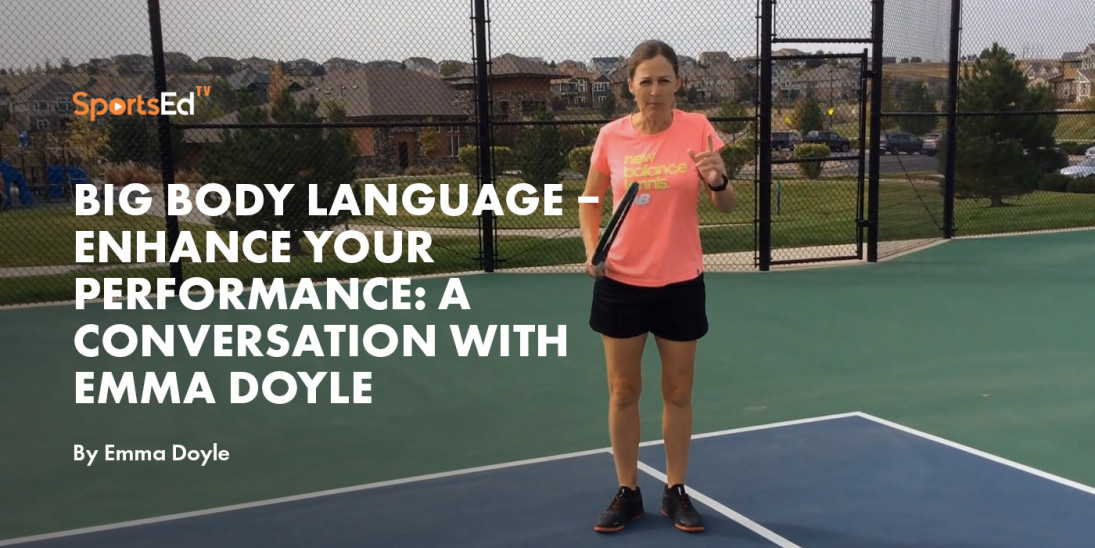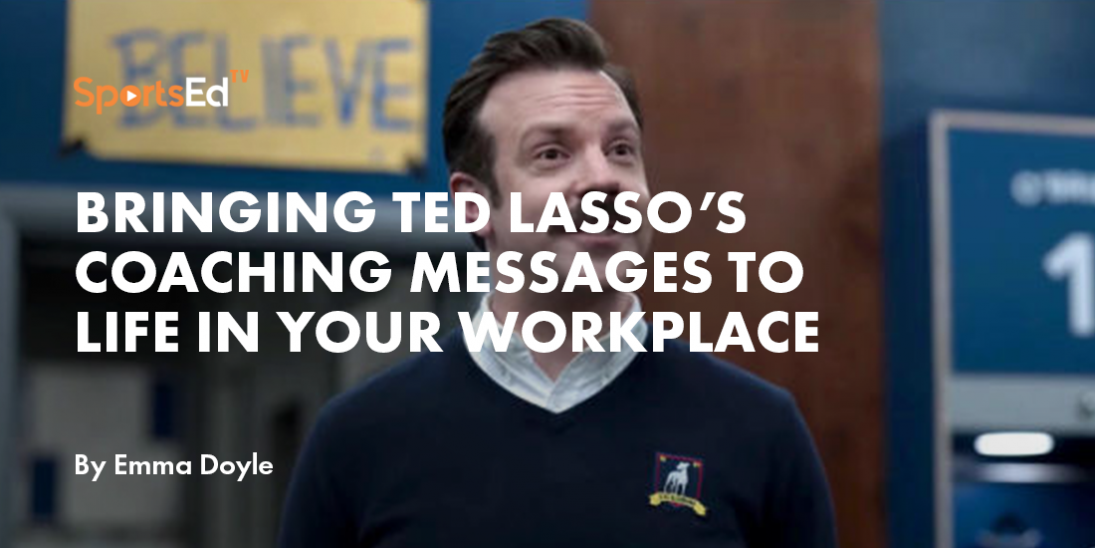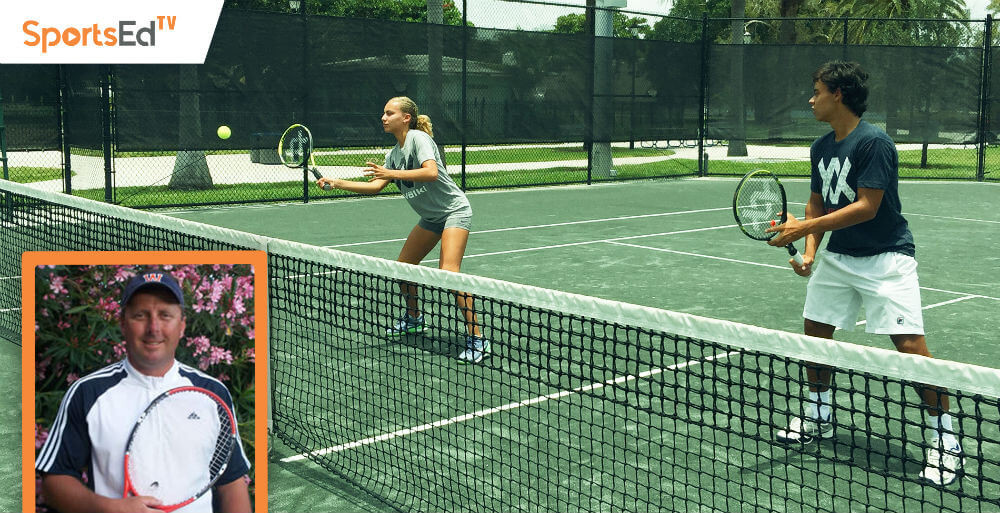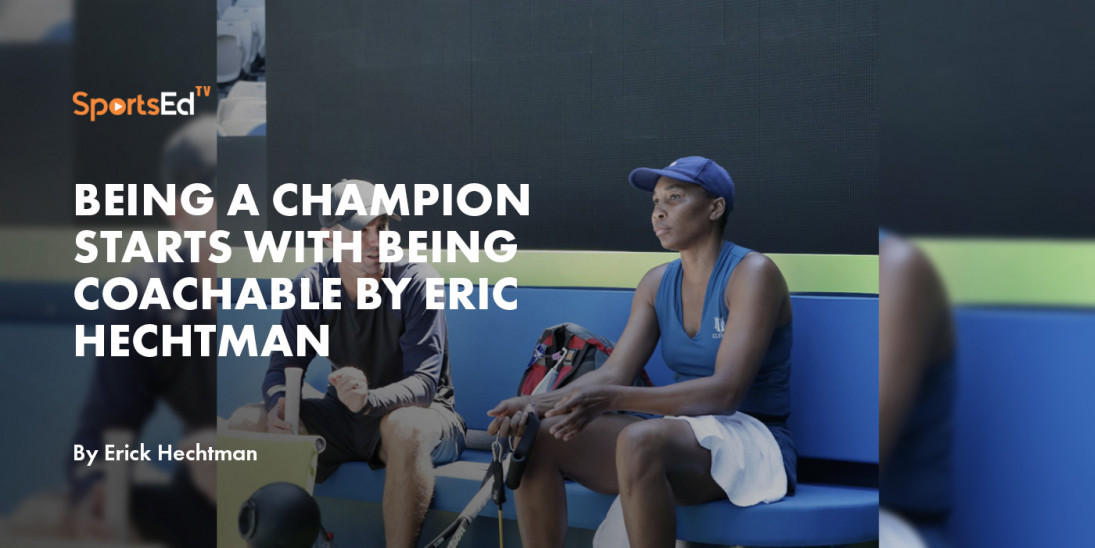Tennis
Welcome and thanks for visiting...

What do all Champions have in Common?

Have you ever wondered what do all champions have in common? Here is what Emma Doyle has to say. Emma is a Tennis Australia High-Performance Coach with a strong background as a tennis touring professional, and a talent development coach and she has represented Australia as a touring coach 40 times having won 4 Asia Oceania world team titles.
As an Emotional Intelligence and Neuro-Linguistic Programming practitioner, Emma has worked with numerous WTA tour players as a Master Mindset conditioning coach. Emma’s pioneering approach to effective communication strategies and coaching techniques encourages people to take authentic action so that they unleash human performance.
What do all champions have in common?
This is a question that has fascinated me for a long time and one that I ask of great players and coaches any time the opportunity presents itself. It is also a common question that all athletes, especially dream-seekers, and aspiring business people want to know the answer to as well.
The first common denominator is that the answer is rarely about technical skills. In other words, the answer has little to do with your hardware, how you hit the ball or how much knowledge you have about the game.
Instead, the answers often speak to the software skills relating to traits associated with having a growth mindset.
Many people are now familiar with Dr. Carol Dweck's research into having a growth mindset that has changed education forever. Dweck coined the terms fixed mindset and growth mindset to describe the underlying beliefs people have about learning and intelligence. A growth mindset sees possibilities, choices, and options. A fixed mindset sees limitations, roadblocks and runs away from challenges.
Here are some examples of a growth mindset that are equally common amongst champion athletes and dream-seekers:
“I can learn anything I want to.”
“I embrace the challenge.”
“Failure is an opportunity to learn.”
“If you succeed, I’m inspired.”
“My effort and attitude determine everything.”
Having this mindset is one thing, now implementing and taking action is where the rubber meets the road. Let’s take a deeper dive into what I am referring to when we drill down into what common traits the best tennis players in the world share in common.
.jpg) Simona Halep - Australian Open 2021
Simona Halep - Australian Open 2021
I had the opportunity to ask this question to a great Australian coach, Darren Cahill, and current coach to world number 3, Simona Halep on a recent episode of The Coaching Podcast. Coach Cahill said that the top 10 male and female players in the world had the following five traits in common:
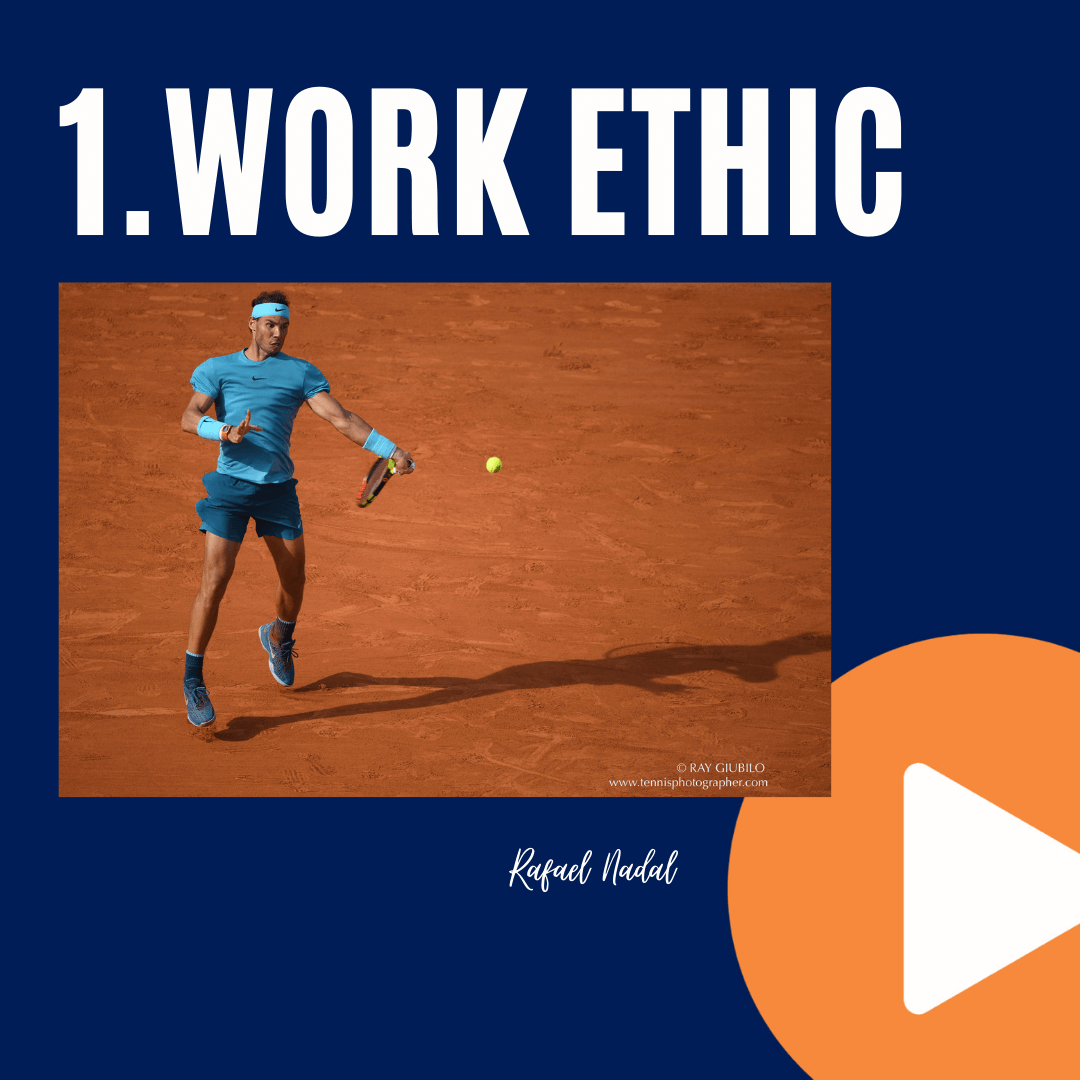
Rafael Nadal
1) Work Ethic – The ability to leave no stone unturned and give your best effort over and over again. He said that Nadal is a level above everyone else.

Roger Federer
2) Purpose – Both the coach and the player need to have a purpose and know the purpose. Connecting the WHY is critical in linking a player’s real desire and motivation. Asking great questions helps to reveal different purposes.

Victoria Azarenka
3) Belief – Developed over time and is at a deep cellular level.
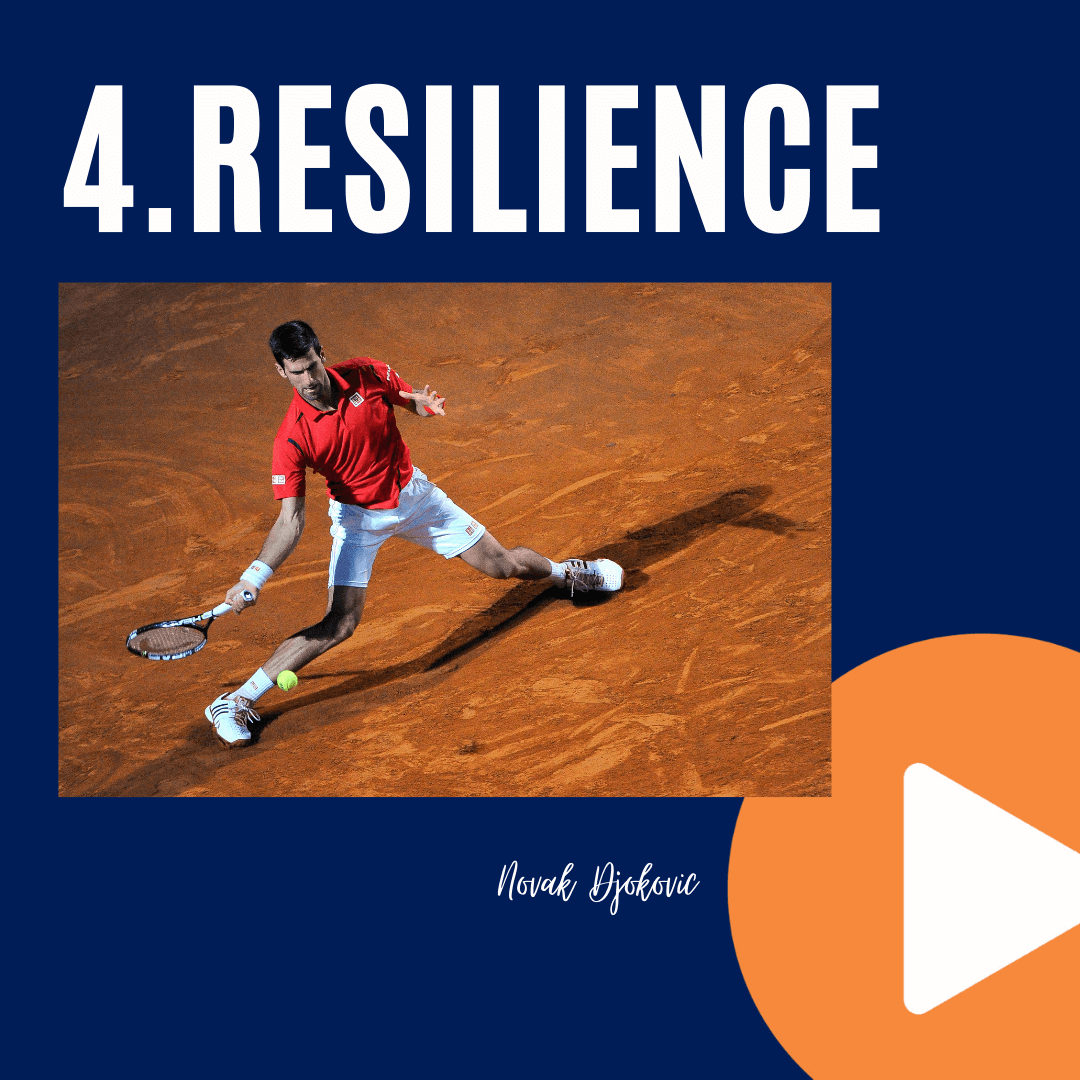
Novak Djokovic
4) Resilience – Having different ways and coping strategies to deal with adversity.

Dominic Thiem
5) Team – Having a solid team where their strengths complement each other.
Certainly, we see these traits in Simona Halep by the way she goes about her tennis training and matches. Equally, all of these traits are accessible to those who are interested in pursuing excellence in their chosen field on or off the court.
The other trait that I have observed throughout my 30 years of coaching is that great athletes ‘do what is required' even when they don’t feel like it. This means that they understand how to push themselves and enjoy crawling through the mud and embrace that moment. It also means that they trust their coach and understand how to respect a periodized program.
Unfortunately, I see too many players not trusting this process and they tend to go too hard on the easy days and not hard enough on the hard training days. All of these areas for development can be changed with a growth mindset and by adopting these champion qualities (the software skills).
Make no mistake about it, this is accessible to all of us who aspire towards greatness.
What are the top five most common reasons as to why top athletes fail?
One of the best qualified people to answer this question is my friend Kyle LaCroix, tennis coach and the Chief Education Officer from SETS Consulting.
He conducted an interesting research project about failure as part of his master’s degree at Stanford. While this research has not yet been published, he surveyed 289 high-performance athletes (145 men and 144 women) from 12 different sports with a range of diverse backgrounds from 29 Countries.
While there are 7 common reasons as to why athletes fail in sport, with the author's permission I share with you the top five;
1) Fear of failure (71 athletes) – This response relates to worrying about what other people think!
2) Negativity (68 athletes) – We have 65,000 thoughts a day and 80% of these tend to be negative. Now add the pressure of competition and the weight of expectations to this statistic.
3) Perfection (54 athletes) – Obsessing over trying to recreate the perfect feeling over and over again, which in sport like tennis is very different because there are numerous variables outside of your control, not to mention having an opponent.
4) Extreme Stress (41 athletes) – Can cause choking due to over-thinking or alternatively, panicking because they are so clouded (not thinking enough) due to being emotionally overwhelmed.
5) Unable to change direction (27 athletes) – Your ego gets in the way or you are too stubborn to make the necessary changes needed to find a way to win.
In my 30 years of coaching experience, these reasons listed above are very common and affect all of us. Failure is not just reserved for elite athletes. The take-home message is that failure is a guaranteed certainty in life and sport. It is comforting to know that even high-performing athletes struggle to cope in these highly emotional and competitive scenarios.
As coaches and players, understanding and embracing failure along with solutions to potential causes, especially those within our control such as preparation, will help to equip us all with more strategies in our coping toolkit.
In other words: "Failure is not the opposite of success, it's part of success."
What are the most common strategies to overcome these challenges?
Below are the top five strategies that I use with my players and clients in the business world alike that are all within your control to help you bridge the gap between failure and success. Both are inevitable.
Adding strategies and more tools in your toolkit can help you take control of your life’s journey because competition and pressure reveal your character. The tools listed below help you to strengthen your character muscles.
1) Justan IPOV – Is a friend who is there to nurture, support and protect you. This fictional character’s acronym stands for: “Just an interesting point of view”
Imagine a giant bubble around your body or a shield and whenever someone makes a negative comment, you can place the comment down to being “just an interesting point of view”. Take on-board the feedback (if you want) and re-frame the comment/s if you think it is going to help you.
Or you have the option to let the comment go, re-bound the comment off your body (using the shield or the bubble image) so that the negative energy does not enter your inner core being.
2) Flip Your Story – Write down a paragraph of your old story. Allow yourself to be as negative as you like. Then flip the words into empowering ones that hold you accountable to what it is that you want for your future. This technique is called, re-write your story.
Here is an example of a new story:
“It is during training and my matches that I choose to connect with feelings of joy because I am making my own decisions. I am a warrior. I use my backhand as a shield and the rest of my game as weapons (the sword) to create patterns of play. I chase every ball and I know I can get to every ball because I work hard on my fitness. It is a weapon. I believe in my ability to set-up points, I keep my court so that winning can take care of itself.”
3) “Next Time” – These two words are complete game changers. They help you to take short and sharp negative comments in the heat of battle and re-frame them in a future based direction. This helps to change your neurology and align your heart, head, and gut with what you need to do better, not what you did wrong.
For example:
Negative statement: “Stopping hitting to the forehand!”
Re-frame statement: “Next time, create an outside ball to open up the weakness.”
Negative statement: “You are playing terrible!”
Re-frame statement: “Next time, prepare earlier and take one point at a time.”
Negative statement: “Why do you keep missing your first serve?”
Re-frame statement: “Next time, toss the ball higher to gain better net clearance.”
4) Longer Exhale – Breathing continues to be one of the best tools to help you change your physiology especially when you are under pressure. It is proven to lower your heart rate simply by taking a longer exhale than your inhale. If you add an associated affirmation with the breath work it is even more powerful.
For example:
Breathe in for 3 seconds and say to yourself “I breathe in confidence”.
Breathe out for 6 seconds and say to yourself “I breathe out doubt”.
5) Curiosity – The opposite of being unable to change your direction is to be curious. It is the quest of every dream-seeker and common amongst high performing athletes.
They want to know why and they want to be able to problem-solve. Working on building your curiosity muscle is key to unlocking your social, emotional and match-fighting skills.
For example, great curiosity questions look like these:
- Next time, what could you do differently?
- What did you learn?
- How can I help you?
- What specifically do you need from me?
- Can you tell me more?
- And then what?
- Tell me in your own words, when you are ready, exactly how you feel about…
I invite you to explore these practical strategies that are 100% within your control and figure out the ones that work best for you.
Why is this information important?
It is important because it is accessible to everyone. I am fascinated to learn more about why people fail and why they become champions so that we can adapt this into our own lives. You are the rockstar in your life movie. Who else is going to play the leading role?
One of my mentors shared with me the confidence formula many years ago and it still holds true today:
Confidence = Time + Experience.
Why not learn from the best players and coaches in the world about success and failure in order to short circuit their experience and add some new tools into your life. When you take action, the results will be seen in your character. Enjoy being curious about what some of these strategies might do for you and live the best story of your life.
The Coaching Podcast
16.75K LISTENS
Coach for Success in Sport and Business
Your hosts Emma Doyle and Simon Blair discuss the differences and parallels between coaching in sport and business. Each show starts with a pre-recorded interview with a coach from the world of sport or business. Emma and Simon or a special guest coach then discuss the themes and insights raised from the interview, providing practical insights for coaches and leaders to drive continuous improvement and coach for success.
Spotify:
https://open.spotify.com/show/1PEkQ4bJ9Fk0GNVCAo8LgT
Apple:
https://podcasts.apple.com/au/podcast/the-coaching-podcast/id1189492103?mt=2
Whooshkaa:


